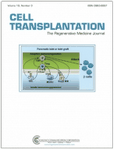
CELL TRANSPLANTATION
Scope & Guideline
Exploring the future of cell and tissue therapies.
Introduction
Aims and Scopes
- Stem Cell Therapy and Regenerative Medicine:
The journal emphasizes the role of stem cells in regenerative medicine, including their potential applications in treating a variety of conditions such as spinal cord injuries, neurodegenerative diseases, and organ failures. - Transplantation Techniques and Innovations:
Research on novel transplantation techniques and methodologies, including xenotransplantation and the use of bioengineered scaffolds, is a core focus, aiming to improve graft survival and functionality. - Cellular Mechanisms and Molecular Pathways:
Studies investigating the underlying cellular and molecular mechanisms of stem cell therapy, including the interaction of stem cells with their microenvironment and immune modulation, are prominently featured. - Clinical Applications and Case Studies:
The journal includes clinical studies and case reports that provide insights into the real-world applications and outcomes of stem cell transplantation, enhancing understanding of efficacy and safety. - Technological Advancements in Cell Therapy:
Research on innovative technologies, such as CRISPR gene editing and 3D bioprinting, aimed at enhancing the efficacy and precision of cell therapies, is a key area of interest.
Trending and Emerging
- Neuroregenerative Therapies:
A significant increase in research focusing on neuroregenerative therapies, particularly for conditions like Alzheimer's disease and spinal cord injuries, reflects the growing interest in using stem cells to repair nervous system damage. - Extracellular Vesicles and Exosome Therapy:
Emerging studies on the therapeutic potential of extracellular vesicles and exosomes derived from stem cells underscore their role in mediating regenerative effects and immune modulation. - Personalized Medicine and Patient-Specific Therapies:
There is a notable trend towards personalized medicine, with research increasingly focusing on tailoring stem cell therapies to individual patient profiles for optimized outcomes. - Immunomodulatory Properties of Stem Cells:
Research on the immunomodulatory effects of stem cells is gaining importance, as understanding these mechanisms is crucial for improving transplant acceptance and reducing rejection. - Integration of Advanced Technologies:
The incorporation of advanced technologies such as machine learning, AI, and CRISPR gene editing into stem cell research is on the rise, offering new avenues for enhancing therapeutic efficacy.
Declining or Waning
- Traditional Organ Transplantation Methods:
Research focusing on conventional organ transplantation techniques has decreased, possibly due to the increasing interest in stem cell therapies and bioengineering as alternative solutions. - Less Emphasis on Non-stem Cell Therapies:
There appears to be a waning interest in non-stem cell-based therapeutic approaches, as the field gravitates towards exploring the unique properties and advantages of stem cells. - Limited Focus on Single-Mode Therapies:
The journal has moved away from studies that advocate for single-mode therapies, reflecting a trend towards combination therapies that integrate various approaches for enhanced efficacy. - Decreased Publications on Invasive Techniques:
There is a noticeable decline in studies related to invasive transplantation techniques, as more researchers explore less invasive and more patient-friendly options.
Similar Journals
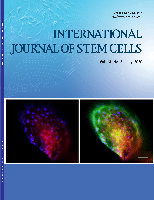
International Journal of Stem Cells
Empowering Scientific Exploration in Cell BiologyThe International Journal of Stem Cells is a distinguished peer-reviewed journal dedicated to advancing the field of stem cell research. Published by the Korean Society for Stem Cell Research, this journal has established itself as a vital source of high-quality research since its inception in 2008. Operating under the ISSN 2005-3606 and E-ISSN 2005-5447, the journal caters to a global audience, featuring works that span a diverse array of topics within Cell Biology and Developmental Biology. It is noteworthy that as of 2023, the journal is ranked Q3 in Cell Biology and Q2 in Developmental Biology, highlighting its growing influence and credibility in the scientific community. Given its commitment to facilitating open scientific communication, it is crucial for researchers, professionals, and students to engage with the rigorous research published in this journal as it profoundly impacts the understanding and application of stem cell science. With accessibility to a wealth of innovative studies, the International Journal of Stem Cells remains an indispensable resource for anyone interested in the transformative potential of stem cell research.
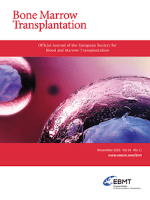
BONE MARROW TRANSPLANTATION
Connecting Researchers to Transform Transplantation Practices.BONE MARROW TRANSPLANTATION, published by SpringerNature, stands as a leading journal in the fields of Hematology and Transplantation, as evidenced by its recognition in the Q1 category for both disciplines according to 2023 rankings. With an impressive impact factor and notable Scopus rankings—7th out of 54 in Medicine Transplantation and 25th out of 137 in Medicine Hematology—this journal is instrumental for researchers and professionals dedicated to advancements in bone marrow transplantation practices and research. Established in 1986, the journal publishes original research, clinical studies, and reviews that push the boundaries of current knowledge, making it essential reading for those looking to stay abreast of the latest developments in the field. Although offering limited Open Access options, BONE MARROW TRANSPLANTATION reaches a broad audience and furthers a global dialogue on best practices and innovative approaches in transplantation medicine. Its address in London, UK positions it at the heart of international research collaboration, fostering connections among scientists, clinicians, and students alike.

TRANSPLANT INTERNATIONAL
Transforming Transplantation Through Open KnowledgeTRANSPLANT INTERNATIONAL is a premier open-access journal in the field of transplantation, published by Frontiers Media SA since 1988. With its dedicated scope encompassing the latest research and advancements in organ transplantation and related fields, this journal serves as an essential resource for researchers, clinicians, and healthcare professionals engaged in transplantation medicine. Boasting an impressive 2023 Scopus rank of #17 out of 54 in the Medicine - Transplantation category and a Q2 quartile ranking, it has established itself as a vital publication platform contributing to the global discourse on transplant innovations. As an open-access journal since 2022, TRANSPLANT INTERNATIONAL enhances the dissemination of knowledge, ensuring that pivotal findings are accessible to a broader audience, thereby fostering advancements in patient care and clinical practices. With its base in Italy and operations managed from Lausanne, Switzerland, the journal promises to remain at the forefront of transplantation research through 2024 and beyond.
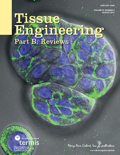
Tissue Engineering Part B-Reviews
Advancing the Frontiers of Tissue Engineering.Tissue Engineering Part B-Reviews is a premier academic journal published by MARY ANN LIEBERT, INC, focusing on the interdisciplinary field of tissue engineering and regenerative medicine. With an impressive impact factor that places it in the Q1 category across multiple relevant fields—including Biochemistry, Bioengineering, Biomaterials, and Biomedical Engineering—this journal provides a vital platform for researchers and professionals to disseminate cutting-edge findings and comprehensive reviews. Covering a vast scope from 2008 to 2024, the journal is committed to advancing knowledge in the application of engineering principles to biological tissues, making it an indispensable resource for those at the forefront of biomedical innovation. While the journal does not currently offer open access options, its rigorous peer review process ensures high-quality contributions that are essential for academic and practical advancements. The journal's rankings in Scopus reflect its significance, catering to a diverse audience of students, researchers, and practitioners seeking the latest insights in this dynamic field.
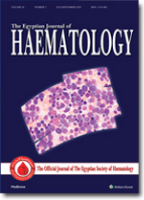
Egyptian Journal of Haematology
Fostering Collaboration for a Healthier Tomorrow in HematologyThe Egyptian Journal of Haematology, published by WOLTERS KLUWER MEDKNOW PUBLICATIONS, stands as a pivotal resource in the field of hematology, particularly within the context of Egypt and the broader Middle Eastern region. This journal is dedicated to disseminating high-quality research that explores the latest advancements in blood disorders, hematologic malignancies, and transfusion medicine. With a focus on original research, case studies, and reviews, it aims to provide a comprehensive platform for hematologists, researchers, and healthcare professionals to enhance their understanding and management of hematological conditions. Although it is not an open-access journal, the rigorous peer-review process ensures that only the most impactful studies are published, contributing to the journal's reputation in the academic community. The Egyptian Journal of Haematology serves as an essential tool for advancing knowledge, improving clinical outcomes, and fostering collaboration among experts in the field.
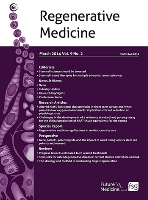
Regenerative Medicine
Exploring the Future of Tissue RestorationRegenerative Medicine, published by Taylor & Francis Ltd, is a pivotal journal within the field of biomedical research, focusing on the innovative advances in regenerative and restored functions in human health. With an ISSN of 1746-0751 and an E-ISSN of 1746-076X, this esteemed journal boasts a commendable impact factor within its categories, notably holding the Q2 status in Embryology and Q3 in Biomedical Engineering as of 2023. Covering a broad spectrum of topics from stem cell research to tissue engineering, it serves as a crucial platform for interdisciplinary collaboration among researchers, professionals, and students dedicated to the regeneration of tissues and organs. Given its comprehensive scope from 2006 to 2024, the journal continues to attract high-quality manuscripts that advance the frontiers of knowledge in regenerative medicine. Researchers and practitioners alike are encouraged to engage with the latest findings and methodologies disseminated in this vital publication.
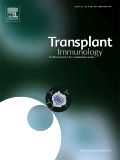
Transplant Immunology
Enhancing Understanding Through Cutting-edge Research.Transplant Immunology is a leading interdisciplinary journal published by Elsevier, dedicated to the advancing field of transplant science and immunology. With a strong reputation in the academic community, it currently holds a significant position in the Q3 quartile in both the Immunology and Allergy categories, as well as Q2 in Transplantation, reflecting its impact and relevance within these fields. Since its inception in 1993, the journal has explored a broad spectrum of topics, ranging from immunological mechanisms to clinical aspects of transplantation, serving as a vital resource for researchers, healthcare professionals, and students alike. Although it is not an open-access journal, it offers critical insights and innovative research findings that bridge theoretical knowledge and practical application, thereby enhancing our understanding of transplant immunology. As the field continues to evolve, Transplant Immunology remains committed to publishing high-quality studies that advance the dialogue between immunology and transplantation, fostering collaboration and discovery.
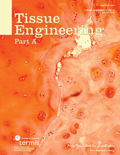
Tissue Engineering Part A
Empowering Scientists to Redefine Regenerative MedicineTissue Engineering Part A is a prestigious peer-reviewed journal published by MARY ANN LIEBERT, INC that focuses on innovative research and advancements within the field of tissue engineering and regenerative medicine. Since its inception in 2008, this journal has played a critical role in disseminating cutting-edge findings that bridge the gap between laboratory research and clinical application, underscoring its significance in the scientific community. With a diverse scope encompassing biochemistry, bioengineering, biomaterials, and biomedical engineering, the journal ranks notably in the Scopus database, holding a Q2 quartile status across multiple categories, thus reflecting its high impact on ongoing research and professional practice. For researchers, professionals, and students, Tissue Engineering Part A serves as an invaluable resource, offering insights into the latest methodologies and breakthroughs that drive the future of healthcare and therapeutic strategies. While primarily a subscription-based journal, it ensures that vital research is accessible to a broad audience of scientists and engineers committed to advancing the life sciences.
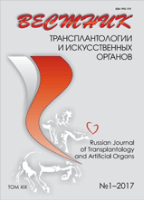
Vestnik Transplantologii i Iskusstvennyh Organov
Empowering collaboration in the science of transplantation.Vestnik Transplantologii i Iskusstvennyh Organov, published by the Federal Research Center Transplantology & Artificial Organs V I Shumakov, is an esteemed open access journal that has been disseminating critical research in the fields of transplantation and immunology since 2009. With an ISSN of 1995-1191 and E-ISSN 2412-6160, this journal serves as a vital resource for academics and practitioners alike, offering insights into current trends, innovations, and methodologies in organ transplantation. The journal is indexed in prominent databases, holding a Q4 category in Immunology and Allergy and a Q3 in Transplantation as of 2023, ranking 42nd out of 54 in the field of Medicine - Transplantation, and 208th out of 233 in Medicine - Immunology and Allergy. Through its commitment to open access publishing and its strategic focus on advancing the science of transplantology, Vestnik Transplantologii i Iskusstvennyh Organov contributes significantly to the global body of knowledge, promoting collaboration and engagement among researchers, healthcare professionals, and students from around the world.

Transplantation and Cellular Therapy
Empowering Discoveries in Cell Biology and Molecular Medicine.Transplantation and Cellular Therapy is a leading journal published by Elsevier Science Inc, dedicated to advancing the fields of transplantation, immunology, cell biology, and molecular medicine. With its ISSN of 2666-6375 and E-ISSN 2666-6367, this journal serves as a vital resource for researchers, practitioners, and students aiming to stay at the forefront of innovative therapies and clinical practices in transplantation. As of 2023, it holds an impressive Q1 ranking in multiple categories, including Cell Biology, Hematology, Immunology and Allergy, Molecular Medicine, and Transplantation, reflecting its high impact and relevance in the scientific community. The journal, operating from its base in the Netherlands, supports Open Access publishing to enhance the dissemination and accessibility of groundbreaking research. Acknowledging the significance of transplantation and cellular therapies in modern medicine, Transplantation and Cellular Therapy is poised to propel future discoveries and developments in these critical domains.